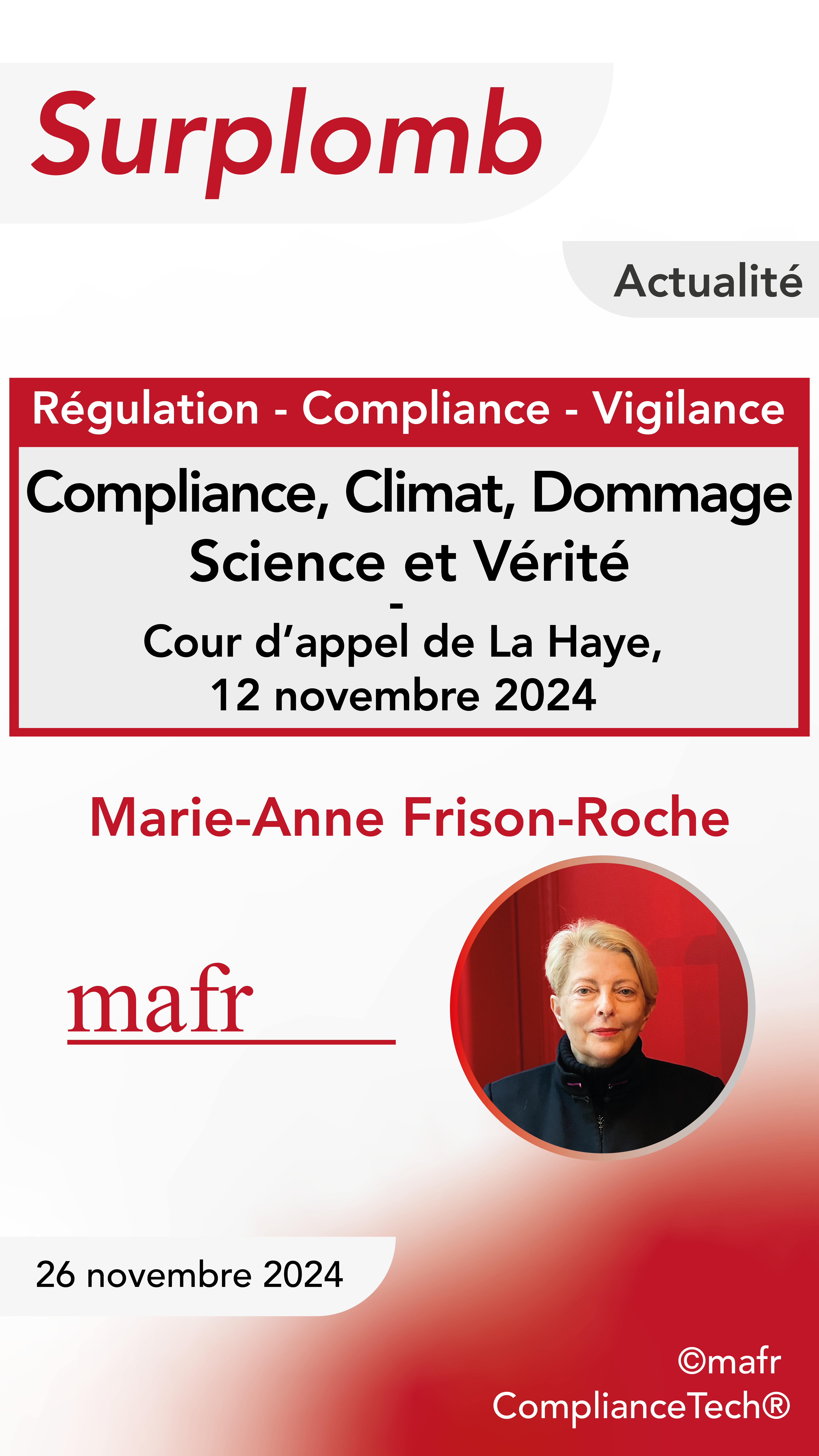Thesaurus : Doctrine

► Full Reference: J.-S. Borghetti, "The Relation between Tort Law and Compliance Obligation", in M.-A. Frison-Roche (ed.), Compliance Obligation, Journal of Regulation & Compliance (JoRC) and Bruylant, "Compliance & Regulation" Serie, to be published
____
📘read a general presentation of the book, Compliance Obligation, in which this article is published
____
► Summary of the article (done by the Journal of Regulation & Compliance - JoRC): The Author points out that in order to establish civil liability, it is first necessary to find fault, i.e. a deviation from an obligation, which will trigger a secondary obligation, that of reparation. But it can also be argued that it is from liability that this primary obligation arises, civil liability then revealing an obligation which existed only implicitly. That establishes a two-way relationship between liability and obligation. The Compliance Obligation illustrates this, in particular through the Obligation of Vigilance conceived by the French law of 2017.
The author therefore devotes the first part of his contribution to civil liability as a result of an Compliance Obligation, especially the Obligation of Vigilance. issued of the French law of 2017. After discussing whether the constraints generated by compliance should be classified as 'obligations', since there is no creditor, which therefore opens the way to liability in tort, he examines the conditions for incurring such liability, which are difficult, particularly with regard to the burden of proof and the demonstration of the causal link. The requirement concerning the latter may evolve in French law towards the admission of proportional causality, as is now accepted in certain cases in German case law.
In the second part of his contribution, the author deals with the hypothesis of civil liability as an indicator of a Compliance Obligation. He points out that the claims made, particularly in the cases of TotalOuganda (France) and Milieudefensie v. Shell (Netherlands) seek to obtain from the judge a such "revelation".
The author considers that it is not possible to draw from the French 2017 law which refers to article 1240 of the French Civil Code on the liability because this article is referred to only in order to organise the consequences of a breach of article L.225-102-4 of the French Commercial Code organising the Obligation of Vigilance (article 1240 being therefore under the secondary obligation described above) and not to feed what this article L.225-102-4 requires under the primary obligation (defined above).
On the other hand, the Shell judgment derives directly from civil liability an obligation to act. This is understandable if one takes the perspective and the measure of the future challenges posed, in this case in the area of climate change. But the author considers that it is up to the legislator to decide on such a development in Liability Law.
____
🦉This article is available in full text to those registered for Professor Marie-Anne Frison-Roche's courses
________
Nov. 4, 2025
Thesaurus : Doctrine
► Référence complète : Ph. Aghion, "L’adversité comme facteur d'innovation", leçon dans le cours Innovation et croissance à travers l'histoire, Collège de France, 4 novembre 2025.
____
► consulter les slides support de la leçon
La première partie de la leçon est sur le rapport même entre l'innovation et l'adversité.
Dans ce rapport, l'innovation arrive pour échapper à la concurrence ou échapper à la réglementation (par exemple le seuil de 50 salariés entraîne des innovations qui visent à aller beaucoup loin que 50 salariés.
Cela peut entraîner un changement technique "biaisé", c'est-à-dire le diriger vers une "innovation verte", c'est-à-dire en y intégrant la réglementation.
Ainsi l'adversité conduit à "diriger" davantage l'innovation, alors que l'innovation sans adversité ne vise qu'à l'intensité.
L'innovation va aussi réagir à des pénuries.
Par exemple une pénurie de main d'oeuvre, au sortir de la Première Guerre Mondiale, notamment dans le secteur agricole, l'analyse étant menée département par département. La pénurie qui est "causée" (causalité mesurée) par la guerre provoque la création des machines agricoles et cause une augmentation de dépôts de brevets (2 brevets en plus sur 100.000 habitants,, voire 3 brevets si le département a été plus touché).
On observe que l'innovation va porter sur la dispense de travail. Analysant le contenu des brevets, leurs mots, ils distinguent les brevets qui économisent du travail et ceux qui ne l'économisent pas particulièrement. La première catégorie a beaucoup plus augmenté que la seconde.
On observe aussi qu'il faut qu'il y ait sur place des personnes aptes à innover et qui travaillent ensemble (masse critique, ancrage local, chaine), le "capital humain" étant mesuré par l'étude exposée par l'orateur, le cumul des causalités amenant à une moyenne de 6 brevets.
Ainsi, même si la guerre a tué des innovateurs, l'effet d'innovation est tout de même plus fort.
La seconde partie de la leçon porte sur le "décollage" économique produit.
La question posée est de savoir si la pénurie a joué un rôle dans les décollages économiques liées aux révolutions industrielles.
L'hypothèse est le décollage serait plus prononcée quand il y a pénurie, l'adoption des technologies et l'exploitation des technologies étant plus forte lorsqu'il y a pénurie de travailleurs en raison de guerre. L'étude porte sur les guerres révolutionnaires et les guerres napoléonniennes.
Menée sur l'Angleterre, la causalité est dégagée à propos du critère de la haute mer car le capital humain étant captée par l'armée, il y a perte supérieure de capital humain, pénurie, accroissement d'équipements mécaniques et industriels autour de la machine-batteuse et l'innovation dans l'amélioration de celle-ci : la pénurie due à la guerre napolénienne a contribué à la Révolution industrielle anglaise.
________
Oct. 2, 2025
Thesaurus : Doctrine

► Full Reference: J.-S. Borghetti, "Le rapport entre le Droit de la responsabilité civile et l'Obligation de Compliance" (The Relation between Tort Law and Compliance Obligation), in M.-A. Frison-Roche (dir.), L'obligation de Compliance, Journal of Regulation & Compliance (JoRC) and Dalloz, coll. "Régulations & Compliance", 2024, to be published.
____
📕read the general presentation of the book, L'obligation de Compliance, in which this article is published
____
► English Summary of this Article (done by the Journal of Regulation & Compliance - JoRC) : The Author points out that in order to establish civil liability, it is first necessary to find fault, i.e. a deviation from an obligation, which will trigger a secondary obligation, that of reparation. But it can also be argued that it is from liability that this primary obligation arises, civil liability then revealing an obligation which existed only implicitly. That establishes a two-way relationship between liability and obligation. The Compliance Obligation illustrates this, in particular through the Obligation of Vigilance conceived by the French law of 2017.
The author therefore devotes the first part of his contribution to civil liability as a result of an Compliance Obligation, especially the Obligation of Vigilance. issued of the French law of 2017. After discussing whether the constraints generated by compliance should be classified as 'obligations', since there is no creditor, which therefore opens the way to liability in tort, he examines the conditions for incurring such liability, which are difficult, particularly with regard to the burden of proof and the demonstration of the causal link. The requirement concerning the latter may evolve in French law towards the admission of proportional causality, as is now accepted in certain cases in German case law.
In the second part of his contribution, the author deals with the hypothesis of civil liability as an indicator of a Compliance Obligation. He points out that the claims made, particularly in the cases of TotalOuganda (France) and Milieudefensie v. Shell (Netherlands) seek to obtain from the judge a such "revelation".
The author considers that it is not possible to draw from the French 2017 law which refers to article 1240 of the French Civil Code on the liability because this article is referred to only in order to organise the consequences of a breach of article L.225-102-4 of the French Commercial Code organising the Obligation of Vigilance (article 1240 being therefore under the secondary obligation described above) and not to feed what this article L.225-102-4 requires under the primary obligation (defined above).
________

Nov. 26, 2024
MAFR TV : MAFR TV - Overhang

🌐suivre Marie-Anne Frison-Roche sur LinkedIn
🌐s'abonner à la Newsletter MAFR. Regulation, Compliance, Law
🌐s'abonner à la Newsletter Surplomb, par MAFR
____
► Référence complète : M.-A. Frison-Roche, "Compliance, Climat, Dommage, Science et Vérité - Cour d'appel de La Haye, 12 novembre 2024", in série de vidéos Surplomb, 26 novembre 2024
____
🌐visionner sur LinkedIn cette vidéo de la série Surplomb
____
____
🎬visionner ci-dessous cette vidéo de la série Surplomb⤵️
____
Surplomp, par mafr
la série de vidéos dédiée à la Régulation, la Compliance et la Vigilance


Updated: July 31, 2013 (Initial publication: Nov. 8, 2011)
Teachings : Les Grandes Questions du Droit, semestre d'automne 2011

Updated: July 31, 2013 (Initial publication: Oct. 4, 2011)
Teachings : Les Grandes Questions du Droit, semestre d'automne 2011

April 9, 2009
Conferences

Référence complète : FRISON-ROCHE, Marie-Anne, "Causalité entre normes comptables et crise financière", in Normes comptables et crise financière, Paris, coorganisé par la Chaire Régulation, KPMG, l’Institut de droit des affaires de Paris II et le Master de Droit des affaires de Paris XI, 9 avril 2009.